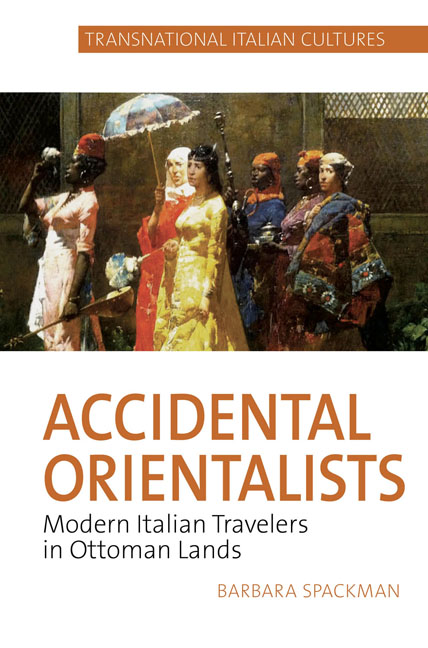Book contents
- Frontmatter
- Contents
- List of illustrations
- Acknowledgements
- Preface
- Chapter One Detourism: The Orientalism of Amalia Nizzoli's Egyptian Memoirs
- Chapter Two Hygiene in the Harem: The Orientalism of Cristina Trivulzio di Belgiojoso
- Chapter Three Male Masquerade in Mecca: Passing and Posing in Nineteenth-Century Egypt
- Chapter Four Muslim in Milan: The Orientalisms of Leda Rafanelli
- Epilogue Divorce Islamic Style: Passing and Posing as Muslim and Tunisian in Postcolonial Italy
- Works Cited
- Index
Chapter Three - Male Masquerade in Mecca: Passing and Posing in Nineteenth-Century Egypt
- Frontmatter
- Contents
- List of illustrations
- Acknowledgements
- Preface
- Chapter One Detourism: The Orientalism of Amalia Nizzoli's Egyptian Memoirs
- Chapter Two Hygiene in the Harem: The Orientalism of Cristina Trivulzio di Belgiojoso
- Chapter Three Male Masquerade in Mecca: Passing and Posing in Nineteenth-Century Egypt
- Chapter Four Muslim in Milan: The Orientalisms of Leda Rafanelli
- Epilogue Divorce Islamic Style: Passing and Posing as Muslim and Tunisian in Postcolonial Italy
- Works Cited
- Index
Summary
“We came to find new things,” I answered boldly. “We are tired of the old things; we have come up out of the sea to know that which is unknown. We are of a brave race who fear not death, my very much respected father – that is, if we can get a little fresh information before we die.”
H. Rider Haggard, She (78)If the harem was the forbidden space that authorized a female Orientalism, Mecca is the forbidden space that becomes the site of a masquerade on the part of a handful of European male Orientalists. In this chapter we will look at the topoi of passing and posing as Muslim in nineteenth-century Egypt in the memoirs of several European male travelers whose national belonging was riven, whether by force or choice. Leaving aside the discursive mode of the picturesque and its feminine connotations, as well as projects of social and religious reform, these travelers are practitioners of an ideology of adventure, and the real-life precursors of the kinds of hero who will later populate H. Rider Haggard's imperial fictions. Like those heroes, they are on a quest for a “little fresh information” before they die, and most especially about the sacred spaces forbidden to Christians upon threat of death, the Meccan and Medina Harams (or “holy places”). Although only one of our writers was born in the British Isles, all four published their accounts in English, a fact which underlines the dominant role played by Great Britain in the distribution and consumption of such narratives throughout the nineteenth century, and which, as Aamir R. Mufti has recently argued, is symptomatic of the role of the English language in mediating world literary relations through Orientalism itself. Our three non-British adventurers, John Lewis Burckhardt (1784–1817), Giovanni Belzoni (1778–1824), and Giovanni Finati (1787– date unknown) were contemporaries of Amalia Nizzoli; they similarly owed the impetus of their migration to the arrival of the Napoleonic army to their respective countries of origin and similarly experienced, indeed profited from, the fluidity of national identities that characterized Muhammad Ali's Egypt.
- Type
- Chapter
- Information
- Accidental OrientalistsModern Italian Travelers in Ottoman Lands, pp. 90 - 153Publisher: Liverpool University PressPrint publication year: 2017



